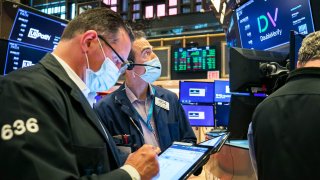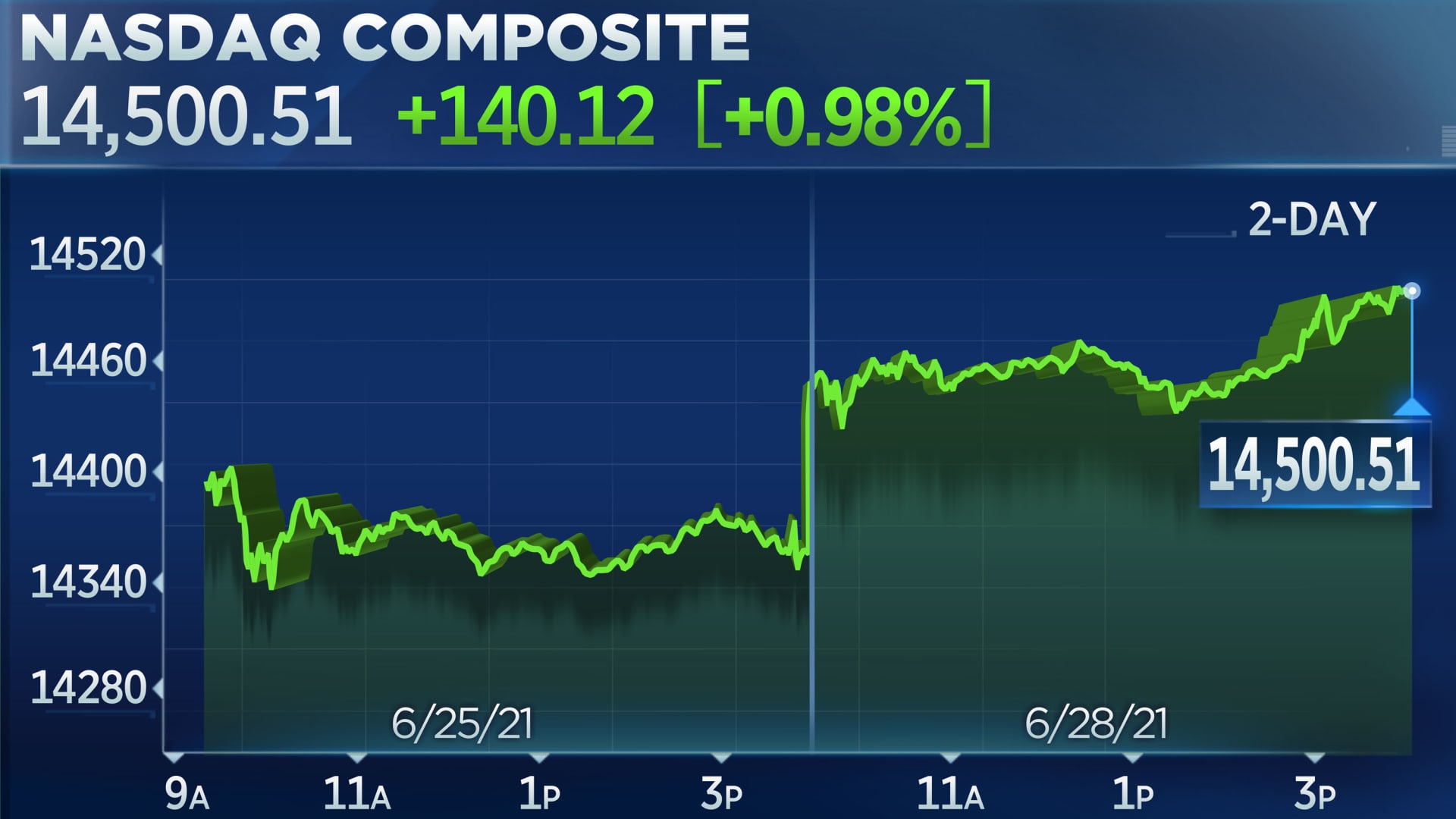
The U.S. stock market set more record highs on Monday, boosted by a court win for Facebook and broad strength in tech stocks.
The S&P 500 ticked up 0.23% to 4,290.61 for its third-straight record close, while the Nasdaq rose 0.98% to an all-time closing high of 14,500.51. The Dow Jones Industrial Average, however, slid 150.57 points to 34,283.27 as energy and transport stocks came under pressure.
Tech stocks were in the driver's seat on Monday, with shares of Apple and Salesforce adding more than 1%. Facebook jumped more than 4% after a U.S. federal court dismissed an antitrust case against the company from the Federal Trade Commission and closed with a market cap above $1 trillion. Semiconductor stocks were a bright spot on Monday, with Nvidia rising 5% and Broadcom climbing more than 2%.
Get top local stories in Southern California delivered to you every morning. >Sign up for NBC LA's News Headlines newsletter.

Aerospace giant Boeing weighed on the Dow, with shares falling more than 3% after regulators told the company it is not likely to receive certification for its long-range aircraft until mid-to-late 2023. CEO Dave Calhoun earlier this month said it expected certification in the fourth-quarter of 2023.
Jeff Mills, the chief investment officer at Bryn Mawr Trust, said recent strength for tech could be part of a continued unwinding of the outperformance of cyclical stocks from earlier in the year.
Money Report
"I think if you look in financials, which are a really good example, I think that became a crowded trade. I think we've had a room clearing out there, so to speak," Mills said. "On the flip side, you look at the Amazons of the world, and a lot of those charts have gone sideways for the better part of six months."
Monday's moves came as Treasury yields retreated across most maturities, with the benchmark 10-year Treasury yield sliding to about 1.48%. Yields move inverse of prices.
"At the sector level, the rates math is characteristically resulting in outperformance of high dividend yield (Utilities, Staples) stocks while Financials are lagging. Energy is the worst performing sector as the broader reflation trade is put on hold," Goldman Sachs' Chris Hussey said in a note to clients.
The session's gains came after Wall Street enjoyed its best week in months as investors grew more confident the current inflation in the U.S. is not a sustained economic threat, but a temporary uptick. The S&P 500 finished the week at a record high, while the Nasdaq added 2.35% in the five-day period.
The weekly gains came even after the Commerce Department reported that its inflation indicator rose 3.4% in May, the fastest increase since the early 1990s.
Spikes in the core personal consumption expenditures price index can cause heartburn for investors since the Federal Reserve likes to watch it for signs of inflation. Still, the month-over-month rise actually undershot what economists polled by Dow Jones had forecast and reinforced for investors that the economy-wide price increases are likely to be transient and manageable.
A massive, bipartisan infrastructure deal appeared revitalized as of Sunday evening after President Joe Biden clarified on Saturday that he doesn't plan to veto the legislation if it comes without a separate reconciliation bill favored by Democrats. Republican senators then said on Sunday that the deal can move forward.
"The bipartisan infrastructure agreement hammered out in Washington DC last week appears to stand some chance of becoming a reality," wrote John Stoltzfus, chief investment strategist at Oppenheimer Asset Management, in a note. "This program could serve the country near and longer term in generating job creation, boost economic growth, underpin corporate revenue and earnings growth and increase the ability of the US to compete with other nations in the still relatively new but hypercompetitive 21st Century."
The next major piece of economic data is the June jobs report, which the Labor Department is scheduled to publish on Friday.
Economists are expecting that nonfarm payrolls increased by 683,000 in June. While such a robust reading would top the 559,000 in May, it would still be below the 1 million some had hoped a recovering U.S. economy could post as it emerged from the Covid-19 crisis.
Investors will also pore over the June report for any signs of wage inflation as employers struggle to find workers to fill job openings and pandemic-era jobless benefits taper off in some states.
Become a smarter investor with CNBC Pro.
Get stock picks, analyst calls, exclusive interviews and access to CNBC TV.
Sign up to start a free trial today.






